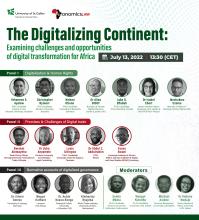Emerging Community Values and Solidarity in the African Digital Economy
The African Continent Free Trade Area (‘AfCFTA’) Protocol on Digital Trade (AfCFTA DTP) presents a significant opportunity to strengthen African digital solidarity. It could also advance a cohesive and strong African consensus and voice on digital trade regulation. This is especially significant, as Africa is relatively silent in global digital trade dialogues today. Building on the international law concept of international community and its African philosophical equivalent, Ubuntu, we offer a framing device to anchor digital solidarity and develop robust and inclusive Africa-centred digital trade norms. We first explore the relevance of community values in developing a regulatory framework for cross-border data flows in trade agreements, and then examine how shared values and digital solidarity can facilitate the development of a cohesive privacy and data protection regulatory framework in Africa.

